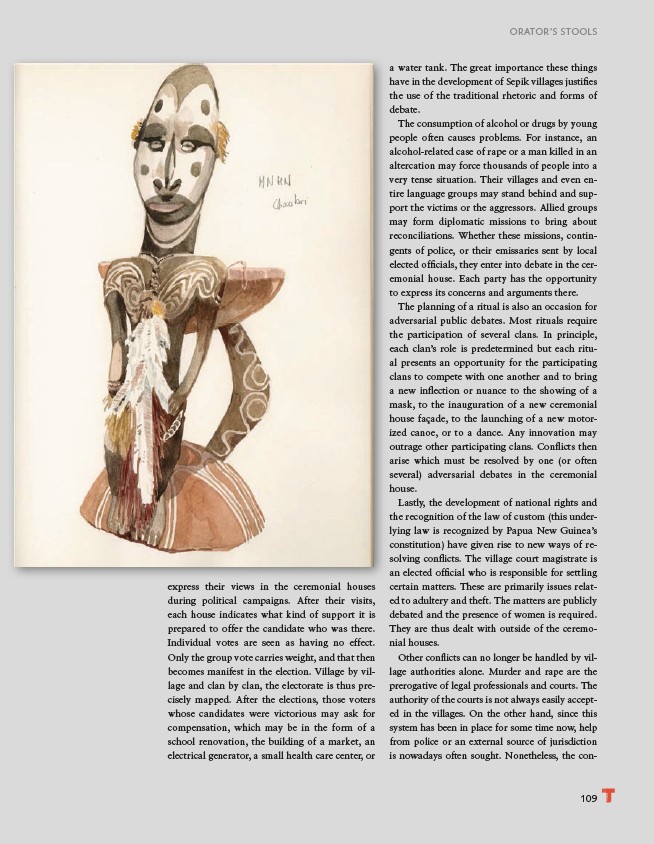
ORATOR’S STOOLS
109
express their views in the ceremonial houses
during political campaigns. After their visits,
each house indicates what kind of support it is
prepared to offer the candidate who was there.
Individual votes are seen as having no effect.
Only the group vote carries weight, and that then
becomes manifest in the election. Village by village
and clan by clan, the electorate is thus precisely
mapped. After the elections, those voters
whose candidates were victorious may ask for
compensation, which may be in the form of a
school renovation, the building of a market, an
electrical generator, a small health care center, or
a water tank. The great importance these things
have in the development of Sepik villages justifi es
the use of the traditional rhetoric and forms of
debate.
The consumption of alcohol or drugs by young
people often causes problems. For instance, an
alcohol-related case of rape or a man killed in an
altercation may force thousands of people into a
very tense situation. Their villages and even entire
language groups may stand behind and support
the victims or the aggressors. Allied groups
may form diplomatic missions to bring about
reconciliations. Whether these missions, contingents
of police, or their emissaries sent by local
elected offi cials, they enter into debate in the ceremonial
house. Each party has the opportunity
to express its concerns and arguments there.
The planning of a ritual is also an occasion for
adversarial public debates. Most rituals require
the participation of several clans. In principle,
each clan’s role is predetermined but each ritual
presents an opportunity for the participating
clans to compete with one another and to bring
a new infl ection or nuance to the showing of a
mask, to the inauguration of a new ceremonial
house façade, to the launching of a new motorized
canoe, or to a dance. Any innovation may
outrage other participating clans. Confl icts then
arise which must be resolved by one (or often
several) adversarial debates in the ceremonial
house.
Lastly, the development of national rights and
the recognition of the law of custom (this underlying
law is recognized by Papua New Guinea’s
constitution) have given rise to new ways of resolving
confl icts. The village court magistrate is
an elected offi cial who is responsible for settling
certain matters. These are primarily issues related
to adultery and theft. The matters are publicly
debated and the presence of women is required.
They are thus dealt with outside of the ceremonial
houses.
Other confl icts can no longer be handled by village
authorities alone. Murder and rape are the
prerogative of legal professionals and courts. The
authority of the courts is not always easily accepted
in the villages. On the other hand, since this
system has been in place for some time now, help
from police or an external source of jurisdiction
is nowadays often sought. Nonetheless, the con-